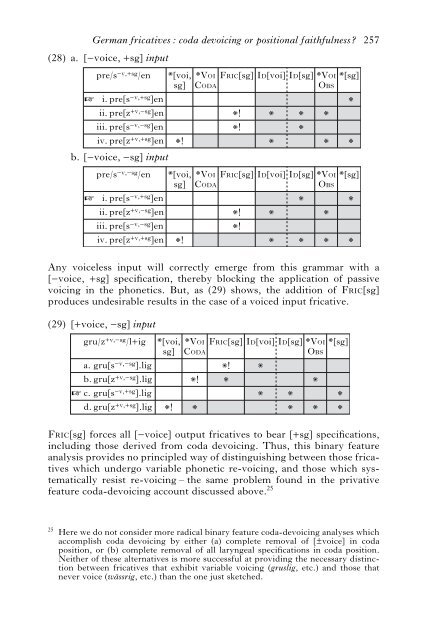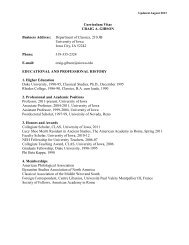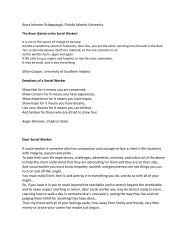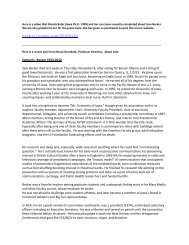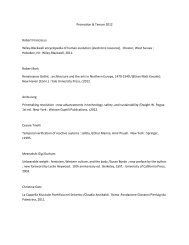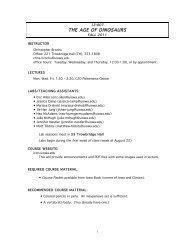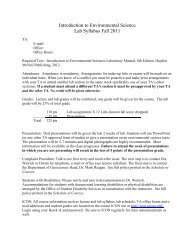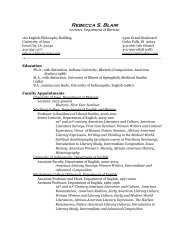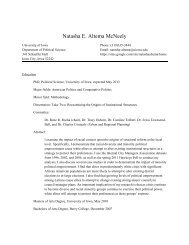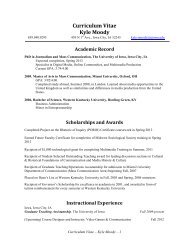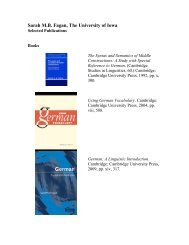German fricatives: coda devoicing or positional faithfulness?
German fricatives: coda devoicing or positional faithfulness?
German fricatives: coda devoicing or positional faithfulness?
Create successful ePaper yourself
Turn your PDF publications into a flip-book with our unique Google optimized e-Paper software.
(28)<br />
a.<br />
<strong>German</strong> <strong>fricatives</strong>: <strong>coda</strong> <strong>devoicing</strong> <strong>or</strong> <strong>positional</strong> <strong>faithfulness</strong>? 257<br />
[—voice, +sg] input<br />
pre/s— v, + sg/en *[voi, *Voi Fric[sg] Id[voi] Id[sg]<br />
sg] Coda<br />
i. pre[s— v, + sg]en<br />
ii. pre[z+ v, — sg]en<br />
*! * *<br />
iii. pre[s— v, — sg]en<br />
*!<br />
*<br />
iv. pre[z+ v, + sg]en<br />
b. [—voice, —sg] input<br />
*!<br />
*<br />
*Voi<br />
Obs<br />
*<br />
*<br />
*[sg]<br />
*<br />
*<br />
pre/s— v, — sg/en<br />
i. pre[s— v, + sg]en<br />
ii. pre[z+ v, — sg]en<br />
iii. pre[s— v, — sg]en<br />
iv. pre[z+ v, + sg]en<br />
*[voi,<br />
sg]<br />
*!<br />
*Voi<br />
Coda<br />
Fric[sg] Id[voi] Id[sg]<br />
*!<br />
*!<br />
*<br />
*<br />
*<br />
*<br />
*Voi<br />
Obs<br />
*<br />
*<br />
*[sg]<br />
*<br />
*<br />
Any voiceless input will c<strong>or</strong>rectly emerge from this grammar with a<br />
[lvoice, +sg] specification, thereby blocking the application of passive<br />
voicing in the phonetics. But, as (29) shows, the addition of FRIC[sg]<br />
produces undesirable results in the case of a voiced input fricative.<br />
(29)<br />
[+voice, —sg] input<br />
gru/z+ v, — sg/l+ig<br />
a. gru[s— v, — sg].lig<br />
b. gru[z+ v, — sg].lig<br />
c. gru[s— v, + sg].lig<br />
d. gru[z+ v, + sg].lig<br />
*[voi,<br />
sg]<br />
*!<br />
*Voi<br />
Coda<br />
*!<br />
*<br />
Fric[sg] Id[voi] Id[sg]<br />
*!<br />
*<br />
*<br />
*<br />
*<br />
*<br />
*Voi<br />
Obs<br />
*<br />
*<br />
*[sg]<br />
*<br />
*<br />
FRIC[sg] f<strong>or</strong>ces all [lvoice] output <strong>fricatives</strong> to bear [+sg] specifications,<br />
including those derived from <strong>coda</strong> <strong>devoicing</strong>. Thus, this binary feature<br />
analysis provides no principled way of distinguishing between those <strong>fricatives</strong><br />
which undergo variable phonetic re-voicing, and those which systematically<br />
resist re-voicing – the same problem found in the privative<br />
feature <strong>coda</strong>-<strong>devoicing</strong> account discussed above.25<br />
25 Here we do not consider m<strong>or</strong>e radical binary feature <strong>coda</strong>-<strong>devoicing</strong> analyses which<br />
accomplish <strong>coda</strong> <strong>devoicing</strong> by either (a) complete removal of [Svoice] in <strong>coda</strong><br />
position, <strong>or</strong> (b) complete removal of all laryngeal specifications in <strong>coda</strong> position.<br />
Neither of these alternatives is m<strong>or</strong>e successful at providing the necessary distinction<br />
between <strong>fricatives</strong> that exhibit variable voicing (gruslig, etc.) and those that<br />
never voice (wässrig, etc.) than the one just sketched.


